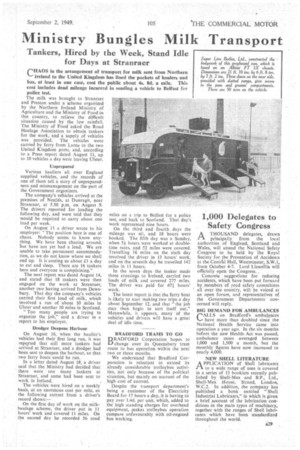Ministry Bungles Milk Transport
Page 31

If you've noticed an error in this article please click here to report it so we can fix it.
Tankers, Hired by the Week, Stand Idle for Days at Stranraer
CHAOS in the arrangement of transport for milk sent from Northern Ireland to the United Kingdom has lined the pockets of haulers and has, at least in one case, cost the public about 4s. 8d. a mile. This cost includes dead mileage incurred in sending a vehicle to Belfast for police test.
The milk was brought to Stranraer and Preston under a scheme organized by the Northern Ireland Ministry of Agriculture and the Ministry of Food in this country, to relieve the difficult situation caused by the low rainfall. The Ministry of Food asked the Road Haulage Association to obtain tankers for the work, and a supply of vehicles was provided. The vehicles were carried by ferry from Lame to the two United Kingdom ports, and, according to a Press report dated August 11, up to 10 vehicles a day were leaving Ulster.
Unprepared Various hauliers all over England supplied vehicles, and the records of one of them tell a story of unpreparedness and mismanagement on the part of the Government organizers.
The company's vehicles arrived at the premises of Nestles, at Dunragit, near
Stranraer, at 5.30 p.m. on August 9. I The drivers reported for loading the following day, and were told that they would be required to carry about one load per week.
On August 11 a driver wrote to his employer: "The position here is one of chaos. Nobody seems to know anything. We have been chasing around, But have not yet had a load. We are unable to take permanent accommodation, as we do not know where we shall end up. It is costing us about £11 a day to eat and sleep. There are 16 tankers here and everyone is complaining."
The next report was dated August 14, and stated that 18 tankers were then engaged on the work at Stranraer, another two having arrived from Dewsbury. That day the company's vehicles carried their first load of milk, which involved a run of about 10 miles in Ulster and another 10 miles in Scotland.
"Too many people are trying to organize the job," said a driver in a report to his employer.
Dredger Deepens Harbour On August 16, when the haulier's vehicles had their first long run, it was repqrted that still more tankers had arrived at Stranraer, and a dredger had been sent to deepen the harbour, so that two ferry boats could be run.
In a letter dated August 18, a driver said that the Ministry had decided that there were too many tankers at Stranraer, and some had been sent to work in Ireland.
The vehicles were hired on a weekly basis, at an enormous cost per mile, as the following extract from a driver's record shows:—
On the first day of work on the milkhaulage scheme, the driver put in 11 hours' work and covered 11 miles. On the second day he recorded 56 road miles on a trip to Belfast for a police test, and back to Scotland. That day's work represented nine hours.
On the third and fourth. days the mileage was nil, and 18 hours were booked. The fifth day was a Sunday, when 54 hours were worked at doubletime rates, and 52 miles were covered. Travelling 16 miles on the sixth day involved the driver in 13 hours' work, and on the seventh day he travelled 142 miles in 11 hours.
In the seven days the tanker made three crossings to Ireland, carried two loads of milk and covered 277 miles. The driver was paid for 671hours' work.
The latest report is that the ferry boat is likely to start making two trips a day about September 12, and that "the job may then begin to sort itself out." Meanwhile, it appears, many of the vehicles and drivers will have a great deal of idle time.
BRADFORD TRAMS TO GO
BRADFORD Corporation hopes to change over its Queensbury 'tram route to bus operation within the next two or three months.
We understand that Bradford Corporation is reluctant to extend its already considerable trolleybus activities, not only because of the political situation, but mainly on account of the high cost of current.
Despite the transport department's being a customer of the Electricity Board for 17 hours a.day, it is having to pay over 1.4d. per unit, which, added to the high standing charges for overhead equipment, makes trolleybus operation compare unfavourably with oil-engined bus working.




























































































